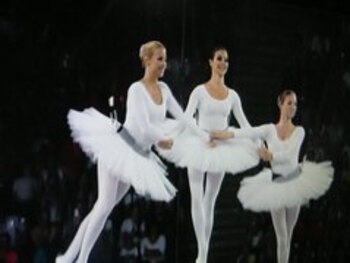
(ATR) The 2013 IAAF World Championship got underway Saturday in Moscow with Usain Bolt breezing through the men’s 100 and Russian president Vladimir Putin speaking at the Opening Ceremony.
There was such a thorough display of Russia’s history in the arts and sciences during the ceremony that one wonders what will be left for Sochi?
The event featured the Battleship Potemkin cutting through the waves like Mo Farah of Great Britain burst through a pack of runners to win the men’s 10,000. Ballerinas attached to wires performed Swan Lake in the air, with some gymnastics moves thrown in.
Russian avant-garde art and composers Stravinsky, Prokofiev and Rachmaninoff also had prominent roles in the ceremony.
Although the athletes were long gone, flagbearers brought in the flags of the 206 nations competing in the 14th World Championships, with the order determined by their English spelling. Although there was barely a pause between names, the procession took a while.
The announcement of Russia got a huge roar, then Ukraine an even louder one. Soon after, the introduction of the United States was received with hoots and whistles.
After the Russian national anthem, Putin gave a brief speech, wishing the athletes luck at the end. That was followed by a longer speech by IAAF president Lamine Diack, with Putin standing stiffly to the side. The Russian president finally started to fidget and look around as Diack went on and on.
Finally Diack finished and they shook hands warmly before Putin officially opened the championships. Star Russian athlete Svetlana Masterkova ran onto the track and passed a baton to a little girl, who was attached to a wire and lifted into the sky.
For the conclusion, a massive fireworks display took place outside the stadium.
Immediately before the 90-minute ceremony, Bolt ran in the seventh and final heat of the men’s 100. He was evidently so intimidating that the guy to his right jumped the gun and was disqualified. Bolt could feel for Kemar Hyman of the Cayman Islands, having done the same thing two years ago in the final at the World Championships in Daegu, South Korea.
Bolt had a time of 10.07 seconds.
"I feel good," Bolt said. "I just did what I had to to qualify. Tomorrow is a big day and I'm looking forward to it."
Two U.S. athletes had the fastest times of the night. Justin Gatlin, running in the third heat, became the first man to break 10 seconds on Russian soil by clocking 9.99 seconds, then in Heat 6, teammate Mike Rodgers ran 9.98.
The third heat was also notable for featuring two athletes who had served drug suspensions: Gatlin, the 2004 Olympic champion, and Dwain Chambers of Great Britain, who also qualified for the semifinals with a time of 10.14.
In the 10,000, Farah took the lead with two laps to go, and the rest of the way was a sprint. He held off Ibrahim Jeilan of Ethiopia, who had nipped him two years ago, to finish with a time of 27 minutes, 21.71 seconds, including a 54.49-second final lap.
"I won the medal that was missing," said Farah. "In 2011, in Daegu, I was second...just. And today I won... just. It's interesting for the spectators, so it's great for the sport."
Farah, who will attempt the double in the 5,000 meters later this week to repeat his performance from the 2012 London Olympics, said he’s been away from home so much "that even my twin daughters don't recognize me; they think I'm a stranger."
In the first medal event of the championships, Edna Ngeringwony Kiplagat of Kenya became the first athlete to win two consecutive World Championships marathons. Her time was 2 hours, 25 minutes, 44 seconds, with Valeria Straneo of Italy 14 seconds behind. Kayoko Fukushi of Japan won the bronze.
Although the race was held in the heat of the day -- starting at 2 p.m. -- the IAAF tweeted that there was no chance the men's marathon would move to a cooler time because of a TV rights deal with Japan.
Long Haul for Journalists
"The buses aren’t coming." Those were the last words about 100 journalists expected to hear at midnight following the first day of the IAAF World Championships. The roads were closed to facilitate Putin’s motorcade leaving the stadium.
The journalists had already walked the long way around the stadium to get to the staging area for buses to their hotels, then had to walk to the nearest metro station with all of their gear. All told, they walked almost three miles.
Parker Morse, a journalist from the United States who speaks Russian, then shepherded the journalists through a train change on the subway line. The journalists arrived at their stop with little time to spare before the system shut down. Morse said the Russian volunteers who escorted the journalists to the metro were worried that the journalists would think badly of their country.
Written by Karen Rosen.
20 Years at #1: Your best source of news about the Olympics is AroundTheRings.com, for subscribers only.
Últimas Noticias
Sinner-Alcaraz, the duel that came to succeed the three phenomenons
Beyond the final result, Roland Garros left the feeling that the Italian and the Spaniard will shape the great duel that came to help us through the duel for the end of the Federer-Nadal-Djokovic era.
Table tennis: Brazil’s Bruna Costa Alexandre will be Olympic and Paralympic in Paris 2024
She is the third in her sport and the seventh athlete to achieve it in the same edition; in Santiago 2023 she was the first athlete with disabilities to compete at the Pan American level and won a medal.

Rugby 7s: the best player of 2023 would only play the medal match in Paris
Argentinian Rodrigo Isgró received a five-game suspension for an indiscipline in the circuit’s decisive clash that would exclude him until the final or the bronze match; the Federation will seek to make the appeal successful.

Rhonex Kipruto, owner of the world record for the 10000 meters on the road, was suspended for six years
The Kenyan received the maximum sanction for irregularities in his biological passport and the Court considered that he was part of a system of “deliberate and sophisticated doping” to improve his performance. He will lose his record and the bronze medal at the Doha World Cup.

Katie Ledecky spoke about doping Chinese swimmers: “It’s difficult to go to Paris knowing that we’re going to compete with some of these athletes”
The American, a seven-time Olympic champion, referred to the case of the 23 positive controls before the Tokyo Games that were announced a few weeks ago and shook the swimming world. “I think our faith in some of the systems is at an all-time low,” he said.




